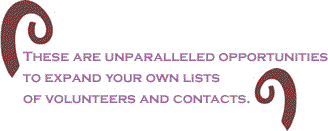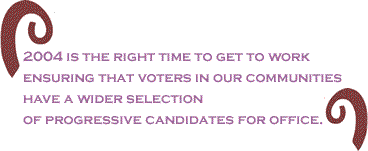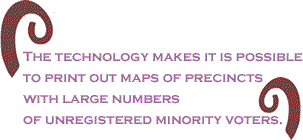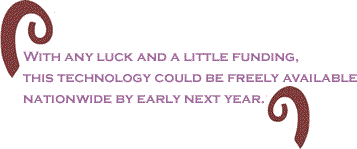
|
|||||||||||||||||||||
|
We’ve all heard that the coming presidential and congressional elections are the most significant in decades, perhaps the most crucial of our lifetimes. While this is important news, it’s not especially good news for African Americans. The number of parties and candidates that will be available to choose from in November is seriously limited and the range of issues those candidates are willing or able to talk about is further narrowed by our country’s media and corporate elite. Voters in most states will search in vain for congressional or senate candidates with a prayer of winning who oppose the policies of permanent war in the Middle East, the explosive growth of the military budget, or who speak out for single payer health care and protection of the right to organize and join unions. On the state level, voters will have a hard time finding on the ballot – much less electing – gubernatorial or legislative candidates who want to equalize funding between rich and poor school districts, or who will search for ways to shrink the prison population instead of expanding it. Looking for a candidate for district attorney who will indict some corporate criminals along with the wife beaters you see in their undershirts on “Cops”? Keep looking.
Despite the presence on the ballot of Barack Obama, Maxine Waters, Cynthia McKinney and a few other happy exceptions, the bad news is that the lack of appealing candidates who address the issues that African Americans care about continues to contradict and undermine the best efforts of progressives to register people to vote and keep them politically engaged. But the good news is that 2004 is the right time to get to work ensuring that voters in our communities have a wider selection of progressive candidates in the next election cycle, and that those campaigns have what it takes to be viable in 2006. Looking beyond 2004 The keys to building viable, vital, progressive
campaigns in 2006 lie in making the most of 2004’s opportunities, starting with the
summer and fall mobilizations for voter registration It’s a long road, easier described than traveled. But better electoral choices and smarter organizations to push them in 2006 can only arise out of long-term, methodical efforts. The time to begin – was yesterday.
Running grassroots electoral efforts for candidates, ballot propositions, etc, is both labor- and knowledge-intensive. Campaign know-how has become largely the province of a small class of pricey consultants whom the big players hire to deploy an arsenal of sophisticated tools to target audiences, package and deliver messages, bring them out to vote, or keep them at home. Lack of access to much of this knowledge is a problem for under-funded grassroots campaigns of all kinds. Consultants zealously guard this knowledge base, thus making themselves indispensable and freezing grassroots activists out of the game. New Internet Tools For cash-strapped community based electoral efforts, and for advocacy groups without a lot of money who want to influence elections, it is far from a level playing field. But for under-funded challengers in Democratic primary elections, things may be about to get a little easier. Ken Colburn and Bill Cooper, the proprietors of the web sites TechPolitics and FairData, have done democracy a great service by providing local organizers free online access to some of the tools which previously only high-priced consultants have been able to deploy and deliver. Colburn and Cooper believe that democracy gets better with use. After reviewing Cooper’s tools, Colburn shared them with his TechPolitics mailing list:
Cooper provides three state links to precinct maps, and easy instructions: “Click on a state link below, then select one of the named precinct maps (choose a city to start), then use the "+" sign in Adobe Acrobat to enlarge the map.”
(Adobe Acrobat is required to view the maps. The + sign within Acrobat enlarges the maps, which can also be downloaded and printed at 11” x 17”.)
In a nation that truly valued popular participation in the electoral process, tools like Cooper’s would be universally available and widely used. But, this is America. Colburn explained to his list members the value of Cooper’s tools:
The maps that the message refers to were produced by overlaying the voter registration lists for the states in question with census data, using state-of-the-art GIS (Geographic Information Services) software. The technology makes it is possible to print out maps of precincts with large numbers of unregistered minority voters.
This is empowering information, placed on the Internet for access by any community group. The advent of this “technology in the service of the people” is a significant step towards making electoral processes more transparent and available to a wider group of players than the traditional information hoarders. “For community groups, obtaining a voter registration list can be prohibitively expensive, at hundreds or even thousands of dollars per copy,” said TechPolitic’s Ken Colburn. “We’ll soon be posting the price list per state on the techpolitics.org web site. Alabama tops the list at $26,653.30 for a copy of the list of registered voters, followed by West Virginia, which asks $16,500 plus the cost of burning the CDs. On the other hand California’s list is only $30, and North Carolina’s is $25.” When such data is prohibitively expensive, democracy becomes a rich man’s commodity. “There are a number of states for which we still don’t have up to date voter files,” said Bill Cooper of FairData.org. “We’d certainly welcome assistance in obtaining some of these.” Hat’s off to the toolmakers
Besides the maps which detail the location of unregistered African Americans by census tract and precinct, Cooper and Colburn between them have assembled a great deal of other useful information. Techpolitics.org has
applied census income and ethnic data to congressional districts
in ways that graphically illustrate the Although it may be too late to generate similar maps for this fall’s general election, there are local elections held in off-years everywhere, and another round of Democratic primary elections begins in early 2006. With any luck and a little funding, this technology could be freely available nationwide by early next year. In the absence of viable third parties – which federal and state election laws make all but illegal – the only route available to most progressive candidacies for public office is via nonpartisan local elections and Democratic primaries. Those are the places where these voter identification tools can be put to the best use. South Carolina’s primary is less than a month away; its voter registration deadline has already passed. North Carolina’s Democratic primary is not far off, and activists in Georgia still have a little more than a month to put unregistered voters on the books before the July 20 primary election. The tools are there. It’s time to get something done.
|
May
20 2004 |
|||||||||
|
|||||||||
|
|
|||||||||
| Printer Friendly Version | |||||||||
 |
|||||||||
| |
|||||||||
| |
|||||||||






























